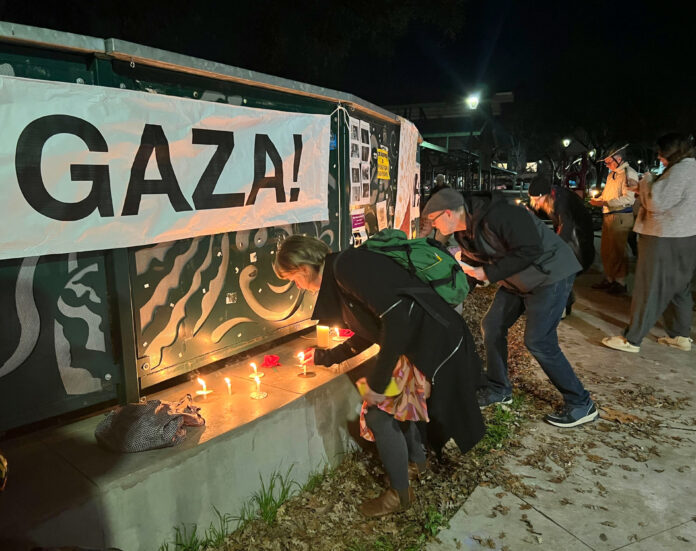The interfaith vigil featured members of different faiths calling for a ceasefire
By CHRIS PONCE — city@theaggie.org
Content warning: This article contains discussion of violence.
On Thursday, Jan. 18, people from different walks of faith gathered at Central Park for one common goal: calling for peace and a ceasefire to the war in Gaza.
A banner at the event read “Rep. Thompson — CEASEFIRE” and signs read “work towards peace, not annihilation” and “no taxes for genocide.” Organizers of the vigil passed out candles, handed out red poppies made of paper and played the tambourine as the number of people in attendance grew.
The event, titled “Interfaith Vigil for Peace in Gaza,” was hosted by people of Jewish, Muslim, Christian and several other faiths who shared common concerns about the number of civilian casualties in the Israel-Hamas war.
“Those of us from different faith traditions who organized this event did this because we grieve with all our hearts and souls the tens of thousands of people who lost their lives, especially the children,” organizer and speaker at the event Nick Buxton said.
According to Palestinian authorities, the death toll in Gaza has surpassed 24,000, with an estimated two-thirds being women and children. The Director-General of the World Health Organization (WHO) Tedros Adhanom Ghebreyesus stated that on average, one child is killed every 10 minutes in Gaza.
Those in attendance prayed for those in the afflicted regions, with children’s shoes hung along a shoe rack to symbolize the children killed since the war began.
“We’re united as a community in believing every life is precious, that a Palestinian life is equally worthy as an Israeli life,” Buxton said. “As [the last speaker] said, a child is dying now every 10 minutes in Gaza. That means by the end of this vigil, six more children will be dead. Children with huge potential, with dreams, with hopes, with possibilities cut short with the drop of a bomb.”
Rabbi Seth Castleman, with the Congregation Bet Haverim, said there is a tendency to forget the interdependence of Jewish Israelis and the Palestinian people.
“Our hearts are broken,” Castleman said. “It’s a scary thought that it’s brave to speak out for peace. The destiny of Jewish Israelis and the Palestinian people are intrinsically tied up in each other, they are interdependent. […] The dividing line is not between Israeli and Palestinian, between Jew and Muslim, between us and them. If there is a line of division it is between those that are for peace and those who are for violence.”
Castleman talked about the cycle of violence and how healing can take years. He shared the story of Moses and the enslavement of the Israelites to Egypt to express his message.
“It took 40 years of wandering to leave behind the mental constriction, the trauma of the enslavement,” Castleman said. “I fear that every time we have another cycle of this violence, we have to reset our clocks for another 40 years of healing.”
Ann Kjemtrup is Muslim and a part of many different faith-based groups such as the Celebration of Abraham and Sisterhood of Salaam Shalom. Kjemtrup believes the vigil was a way for the community to support each other outside of echo chambers.
“It’s a time where we really have to hear each other’s pain,” Kjemtrup said. “It’s not the people on the ground who are doing this — it’s power, it’s money, it’s so many things [that are] causing this pain and destruction. We need to find a way to be able to connect with each other, away from the slogans and away from echo chambers.”
There have been several campus protests for Palestine since the Oct. 7 attacks and a surge of related activism across college campuses. Kjemtrup said that if anyone is going to be politically active, they need to do so peacefully.
“The bottom line should be activism about peace,” Kjemtrup said. “If you’re going to [use] islamophobia and antisemitism, that should not be part of our push for peace and I’m sorry that it is. I think today’s event underscored that everybody is human, everybody is feeling pain and it doesn’t matter what religion you are.”
Buxton shared that today’s event showed the importance of interfaith diversity in events like this.
“What we showed is that there isn’t a face divide here,” Buxton said. There is of course a difference of opinions but there is actually unity across all faiths about the preciousness of life.”
He shared that some in the community have ties to those in Israel and Gaza, including a friend of his who’s lost dozens of her family members.
“I have a friend whose sister lives there right now, who’s lost 55 [members] of her extended family,” Buxton said. “She’s not been able to contact her sister for seven days — her closest relative — and she doesn’t know if she’s alive. She’s a friend, it’s horrifying and it compels us as humans to respond and to act.”
Buxton is a Christian and shared the role his faith has had in responding to the events overseas.
“A core tenet of Christianity is to love your neighbor as yourself, and our neighbor, we need to think of it as not just who we live next to in Davis,” Buxton said. “We are in a global community; our neighbor is a family in Gaza [and] a family in Israel.”
Written by: Chris Ponce — city@theaggie.org











